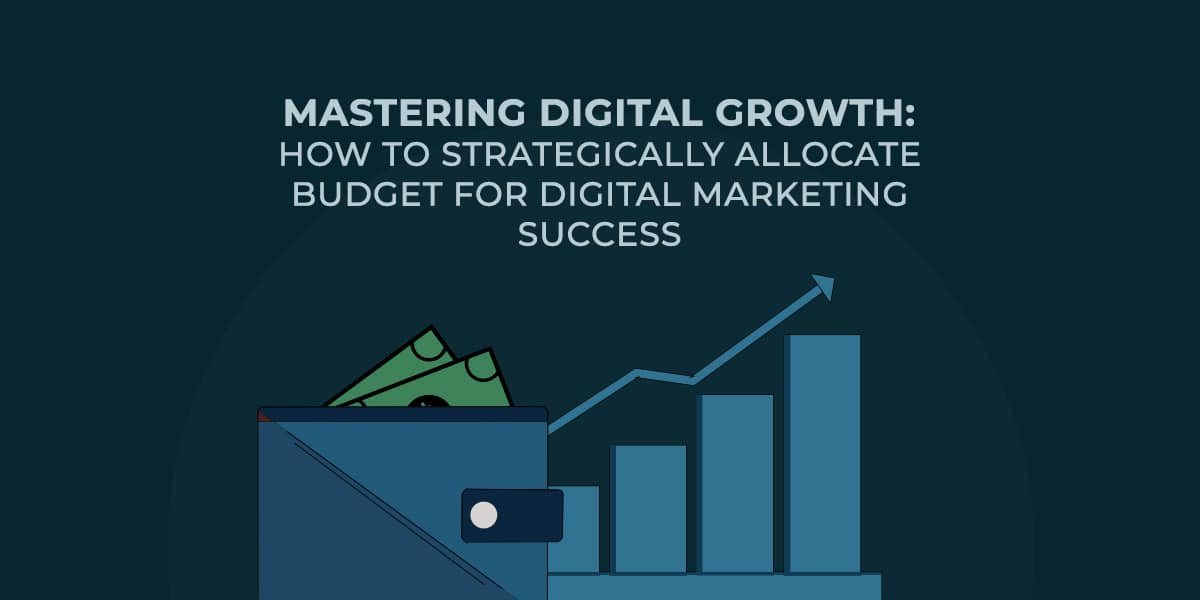How to Allocate Budget for Digital Marketing Success
Effectively allocating a digital marketing budget is essential to maximize the return on investment (ROI) and achieve desired outcomes in today’s leaner environment.
Our agency — No to The Quo — is a team of loyal, talented people that help others build their businesses every day and love what they do. You can see our powerful partnerships here on our site.
In this guide, we will explore the process of allocating a digital marketing budget, covering important steps such as assessing business needs, understanding various types of digital marketing services, and tracking and measuring key performance indicators (KPIs) to ensure success. By following these guidelines, you can strategically allocate your budget and leverage the potential of digital marketing to propel your business forward.
Allocating your Budget: Assessing Your Business Needs
Allocating a digital marketing budget requires a comprehensive understanding of your business goals, current marketing efforts, and areas in need of improvement. By carefully assessing these factors, you can develop an effective budget that maximizes your return on investment (ROI) and drives the growth of your business. Let’s explore three crucial steps to assessing your business needs.
1. Defining your marketing goals:
Before allocating your digital marketing budget, it is essential to clearly define your marketing goals. Your goals should align with your overall business objectives and provide a roadmap for your digital marketing strategy. Ask yourself what you aim to achieve through your marketing efforts. Are you looking to increase brand awareness, generate more leads, drive sales, or enhance customer loyalty? Each goal will require a different allocation of resources.
Consider setting specific, measurable, attainable, relevant, and time-bound (SMART) goals. For instance, instead of stating a vague goal like “increase website traffic,” a SMART goal could be “increase organic website traffic by 20% in the next six months.” SMART goals help you set realistic targets and measure your progress accurately.
2. Evaluating your current marketing budget allocation efforts:
To make informed decisions about your digital marketing budget, evaluate your existing marketing efforts. Assess the performance of your current campaigns, channels, and tactics. Analyze key performance indicators (KPIs) such as website traffic, conversion rates, engagement metrics, and customer acquisition costs. Identify which marketing channels and strategies are yielding the best results and which are falling short.
Furthermore, consider the effectiveness of your current marketing budget allocation. Are you overspending on certain channels with minimal returns? Are there underutilized opportunities that could be leveraged for better results? By understanding the strengths and weaknesses of your current marketing efforts, you can optimize your budget allocation for maximum impact.
3. Identifying gaps and areas for improvement:
Once you have evaluated your current marketing efforts, identify any gaps or areas for improvement. Look for opportunities to fill those gaps and enhance your marketing performance. For example, if you find that your website lacks search engine optimization (SEO) efforts, allocating a budget towards improving your website’s visibility in search results could be a valuable investment.
Consider the evolving trends and technological advancements in the digital marketing landscape. Are there emerging platforms or techniques that could help you reach your target audience more effectively? Stay up-to-date with industry trends and explore new strategies to stay ahead of the competition.
You can develop a well-informed digital marketing budget by assessing your business needs through defining marketing goals, evaluating current efforts, and identifying gaps. This budget will allow you to allocate resources strategically, prioritize investments that align with your goals, and continuously improve your marketing performance. Remember that ongoing monitoring and analysis of your marketing efforts are essential to refine your budget allocation over time.
Types of Digital Marketing Services
“Digital marketing” takes many forms. Understanding these general areas can allow you to see the bigger picture — this is essential to learning how to allocate a budget for digital marketing.
Search Engine Optimization (SEO):
Pros: Generates sustainable organic traffic, enhances website credibility and trust, cost-effective in the long run.
Cons: Results may take time to materialize, requires continuous monitoring and adaptation to search engine algorithms, can be challenging to achieve high rankings in competitive industries.
Pay-Per-Click Advertising (PPC):
Pros: Immediate visibility and traffic generation, highly targeted audience segmentation and ad customization, complete control over budget and ad spending.
Cons: Can be expensive, especially for competitive keywords and industries, requires ongoing campaign management and optimization, ad visibility ends when the budget is depleted.
Social Media Marketing:
Pros: Wide reach and potential for viral content, direct engagement and interaction with the audience, advanced targeting options based on user demographics and interests.
Cons: Requires consistent and engaging content creation, can be time-consuming to manage multiple social media accounts, difficult to measure precise ROI and impact on sales.
Email Marketing:
Pros: High ROI compared to other marketing channels, direct and personalized communication with subscribers, automation options for efficient lead nurturing.
Cons: Requires a well-maintained and engaged subscriber list, risk of emails being marked as spam or unsubscribed, success depends on delivering valuable and relevant content.
Content Marketing:
Pros: Increased brand authority, improved SEO, establishes thought leadership.
Cons: Requires consistent content creation, a deep understanding of the target audience, time and effort to achieve tangible results.
Setting Your Online Marketing Budget
When it comes to allocating your digital marketing budget, several factors deserve careful consideration. Every growing business is in pursuit of the same success, but the path you take to get there is going to vary depending on circumstances unique to you and your business.
- Industry: Evaluate the competitiveness of your industry in the digital space to determine the appropriate budget allocation.
- Competition: Monitor your competitors’ digital marketing efforts and adjust your budget accordingly to stay ahead.
- Target Audience: Understand your audience’s preferences and online behavior to focus your budget on the channels that resonate with them the most.
- Goals: Clearly define your marketing goals and align your budget with them, whether it’s expansion, customer acquisition, or brand building.
Prioritizing Your Marketing Budgets Based on Your Goals:
Identify the marketing channels that align closely with your goals, such as social media, content creation, PPC, or SEO. Prioritize investments that provide both immediate impact and long-term results.
By carefully considering these factors, using a percentage of revenue model, and prioritizing based on your goals, you can allocate your digital marketing budget strategically and set your business up for success.
Tracking and Measuring Your Results; Marketing ROI
KPI tracking for each type of digital marketing service empowers you to make informed decisions, identify high-impact opportunities, optimize performance, assess ROI, and adapt your budget allocation as needed. It ensures that your budget is strategically allocated to the channels and campaigns that drive the best results for your business, ultimately leading to a more effective and successful digital marketing strategy.
Some commonly used KPIs include conversion rate (measuring the percentage of website visitors who take a desired action), click-through rate (evaluating the percentage of users who click on an ad or link), return on investment (measuring the profitability of marketing campaigns), and engagement metrics (such as likes, shares, comments, and time spent on a website or social media platform).
These KPIs provide valuable insights into the performance of digital marketing activities, allowing businesses to optimize their strategies and achieve their marketing goals. These are really some of the best ways to actually get to know your customers and what they want.
Then, always remember to continue adjusting your budget and strategy based on your results. Not only does your customer base shift and change but so does the industry you work in and other factors. Adapting to new angles of digital marketing is important for any company growing online.
The Power of Partnering with a Digital Marketing Agency
Allocating a digital marketing budget for your business is always a balancing act — having a talented team to join forces with can lead to outsized results.
Partnering with a digital marketing agency can be a game-changer for growing businesses online. Not only do these agencies bring a wealth of expertise and specialized knowledge to the table, but they also offer valuable industry insights and best practices that can propel your business forward. This means you can make informed decisions when allocating your company’s budget across these various channels, ensuring that every dollar is spent wisely.
What sets digital marketing agencies apart is their ability to optimize budget allocation. With their in-depth understanding of different marketing channels and their potential returns on investment, these agencies can analyze your business goals, target audience, and market competition to develop a tailored plan.
We talk about these things because No To The Quo is about development, not just the dollar. Our concept of a digital marketing agency is rooted in good relationships and even better results as time goes on. Get a hold of us and let’s talk about how we can challenge the status quo and achieve some really cool stuff.
Digital Marketing No To The Quo



